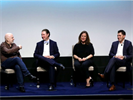Paul Holmes 04 Nov 2012 // 12:00AM GMT
MIAMI—Can compelling culture drive or facilitate business change? That was the topic of a discussion at the Global Public Relations Summit in Miami, led by Elise Mitchell, CEO, Mitchell Communications Group (pictured), and featuring three senior communicators with international experience: John Forrest Ales, senior director, global brand public relations, Hilton Hotels & Resorts; Andy Pharoah, senior vice president, corporate affairs, sustainability and strategy, Wrigley; and Anne Villemoes, director, corporate communications, Danish Crown.
What follows is an edited transcript of some of the big questions considered by the panel.
Elise Mitchell: Today we are going to explore how corporate culture can drive positive business change. To begin, I would like to ask you to describe the culture at your company.
Andy Pharoah: The most important thing to remember when it comes to culture is that it doesn’t matter what you say; it’s what people observe. Wrigley is a very Midwestern culture. It’s a very collaborative culture, and if you are not collaborative, the culture kills you. We were acquired by Mars three-and-a-half years ago, and so we are now part of the Mars culture. But Wrigley was a values-based business and so is Mars, which has five principles that guide every aspect of its business activity, so there are a lot of similarities.
John Forrest Ales: We are really in the experience business and culture is so important to shape that experience. It is very important that our team members and our customers understand what makes us special. Since we were founded, our mission has been “to fill the earth with the light and warmth of hospitality” and in recent years we have focused on empowering our team members to drive that mission.
Anne Villemoes: We are in a different position, because we kill for a living. We are a company that was created by mergers, at a time when culture was not foremost in the minds of the farmers who owned our business. I thought we had no culture, but of course we had a culture, we just did not have a defined culture. So it was a problem. We have started to work on it, but we are not fully there yet.
EM: How do you make a global culture meaningful and relevant to a diverse employee base?
JFA: We are as diverse as you can get. We have team members in 80 countries. To get everyone on the same pahe we have spent the past two years created a YouTube meets Twitter meets Facebook system for our employees around the world. It has become the online home for our culture, a place where our culture in reinforced. We drive discussions, but it’s an environment where discussions can happen organically, and it has changed the way we do business.
AP: Having a degree of consistency is critical, and going into the future it will be even more useful. We have associates who are making decisions every day and they need to understand how those decisions affect the company. The way we make it meaningful is… we have these five principles, and every day in our company there we are debating issues around those five principles.
EM: Part of how you pass the culture on is you talk about it.
AP: Most people forget 90 percent of what they hear, so you have to reinforce it constantly.
AV: We have a lot of production workers and farmers among our employees to we don’t use a lot of big fancy words. We had these core values, one of them was to be respectful. I asked whether there was a company that had as a value to be disrespectful, because if there wasn’t then that wasn’t a meaningful value. And so we replaced those values with one sentence, “It’s all about food.” It was a way to say to the farmer, “Ask yourself if people who see how this food is being produced would consider it food and want to eat it.”
EM: How does culture drive business change? Are there examples where culture made a difference in allowing you to drive the business forward?
JFA: One of the challenges for us is to make sure every guest feels cared for and respected, and a couple of years ago we introduced a program for Chinese guests, many of whom were traveling overseas for the first time, to make sure they felt at home. In the old days we would have created a toolkit and sent it to individual hotels, but with the new website, we managed to get excitement going, but then our hotels in China started to explain to the rest of the world about various holidays, about Chinese cuisine. We had discussions online with folks from around the world. The beta testing and global research was running itself.
EM: It was probably much more credible coming from their peers than from corporate.
AP: Business is operating in a fast-changing world. Last year we changed our strategy-making process. We wanted to get to a number of key strategies we would focus on within the organization, and the culture made it possible for us to roll out the new strategy so that after four months we had 85 or 86 percent of people understanding what those strategies were and how they fit in, because we had a culture that valued engagement and cascading communications and that worked really well.
AV: I came on board after a big scandal involving a tabloid television reporter and a hidden camera. They asked me how to avoid that kind of scandal in the future, and I said, “That’s pretty easy. Start cleaning.” It was not what they wanted to hear, but now we have the mindset that we would rather have heart surgery on the floor of our factory than in any hospital in the world, it’s so clean.


































.jpg)

















